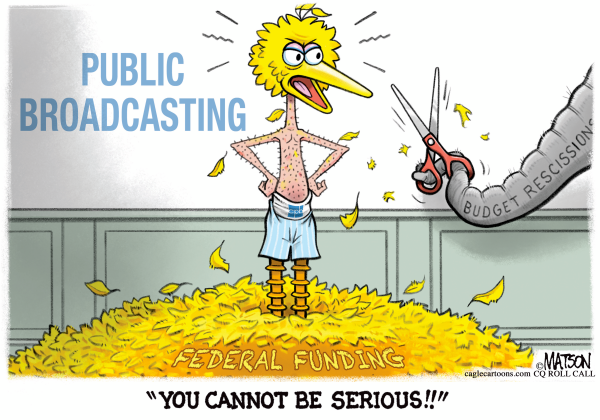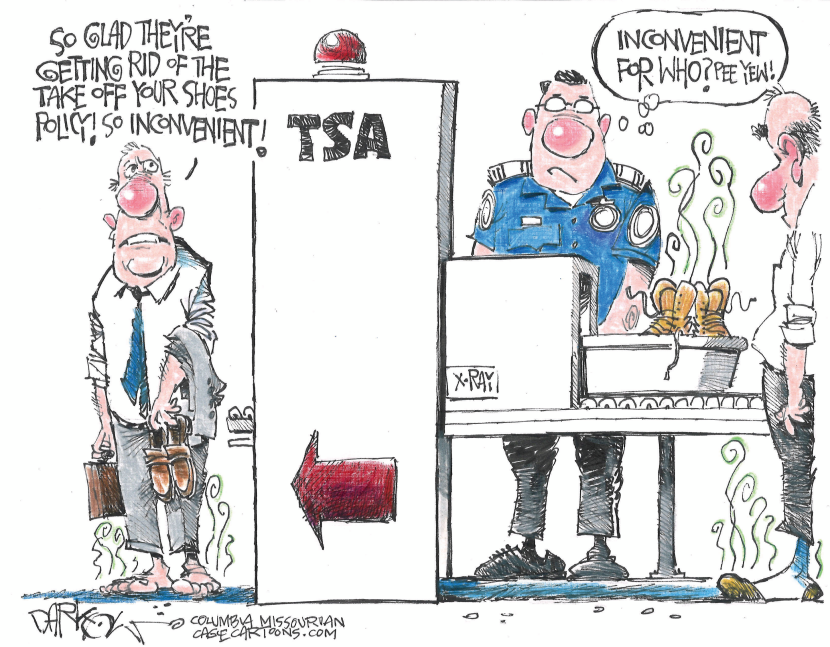We live in a world where technology changes quickly and often, while human nature remains relatively unchanged.
For most of us, human nature is the key variable.
I suspect Henry Ford focused on that when he said, "Whether you think you can or you think you can't. You're right."
Processing the possibilities of tomorrow is often difficult for humans. Part of the problem is that we're wired to think locally and linearly. It's a monumental task for us to comprehend exponential growth, let alone its implications. For example, consider what happened to seemingly smart and forward-looking companies like Kodak, Blockbuster, and RadioShack.
The world changes quickly.
Change is constant. The wheels of innovation and commerce spin ever-faster (whether you're ready for it or not).
As a practical matter, it means that you get to choose between the shorter-term pain of trying to keep up ... or the longer-term pain of being left behind. Said another way, you have to choose between chaos and nothing.
It's hard to keep up – and even harder to stay ahead.
Personally, I went from being one of the youngest and most tech-savvy people in the room to a not-so-young person close to losing their early-adopter beanie. Sometimes it almost seems like my kids expect me to ask them to set my VCR so it stops flashing 12:00 AM all day.
My company may not be doing "rocket science", but it's pretty close. We utilize exponential technologies, such as high-performance computing, AI, and machine learning, to amplify intelligence and make data-driven, evidence-based decisions in real-time, all the time.
But, as we get "techier," I get less so ... and my role gets less technical, over time, too.
Due to my age, experience, and tendency to be a pioneer, I've been battling technology for decades.
Don't get me wrong, technology has always been my friend, and I still love it. But my relationship with it is different now.
I recognize that there are things that change and things that stay the same. And for me, the things that "stay the same" tend to be more important.
Paradoxically, the part of me that stays the same can still change and grow – that is how you become more (and a more evolved version) of that thing.
The Bigger Picture
My father said that not worrying about all the little details helped him see the bigger picture and focus on what was possible.
You don't have to focus on the technological details to predict its progress. Anticipating what people will need is a great predictor of what will get built. That means predicting "what" is often easier than predicting 'how'.
Why is that often the case? Because technology that solves a problem is more profitable and popular than technology searching for a problem to solve.
Here's a video from 1974 of Arthur C. Clarke making some remarkably accurate predictions about the future of technology.
via Australian Broadcasting Corporation
Artificial Intelligence, quantum computing, augmented reality, neuro-interfaces, and a host of exponential technologies are going to change the face and nature of our lives (and perhaps life itself). Some of these technologies have become inevitabilities ... but what they enable is virtually limitless.
Where do you see this going?
Onwards.




The Future of Biohacking
Today’s my birthday. I woke up on the right side of the dirt, in America, grateful for the opportunities ahead.
So far, so good.
For me, birthdays also invite a moment to pause and reflect on where I am, where I want to go, and what it’ll take to get there.
On the health front, I’m reminded of a simple truth: A healthy person has a thousand dreams, while an unhealthy one has only one.
Thankfully, I still have many dreams.
We’re lucky to be born late enough in human history that medicine isn’t just about fixing what’s broken—it’s about regeneration and life extension. The real promise isn’t just living longer, but living well longer.
That’s a future worth investing in.
So today, I’m dusting off some notes from a meeting I had years ago—lessons that feel more relevant than ever.
A Chat With The Father of Biohacking
In 2018, I was in Alaska at Steamboat Bay for a CEO retreat. I was spending time with a friend, Dave Asprey, a successful serial entrepreneur, author of several great books, and a thought leader in biohacking. In many ways, he’s the father of modern biohacking.
We recorded a video where Dave did a great job of relating his world to the world of Capitalogix and trading. I share it in part so you can experience his wide range of interests and expertise. It holds up well. I encourage you to watch it.
Via YouTube.
In the video, Dave explains that life evolves through a series of algorithms operating at microscopic levels. Your body and brain are made of tiny parts working like clever little computers. These parts constantly talk to each other, sense what’s happening around them, and change their behavior to keep you alive and thriving.
Dave points out that there are striking similarities between genetics/epigenetics and modern digital algorithms. Markets and businesses make numerous small decisions and adjustments to achieve significant outcomes.
In a sense, Markets and industries function like biological environments where algorithms continuously evolve and adapt.
It helped me reframe my perspective on my business. But it also got me thinking more about my health and how I wanted the next 20 years of my life to look. As a result, I started taking care of my health and paying more attention to preventive care.
Health is the foundation that gives all ambitions a place to stand.
Focusing on the positive is important, but extending your healthy lifespan starts by being honest with yourself and identifying what you and your body struggle with the most.
A doctor friend gave me some advice. He said it doesn’t matter if you’re on top of 9 out of 10 things; it’s the 10th that kills you.
The goal isn’t just to stay alive longer; it’s to live life to its fullest for as long as possible.
I recently joined a fantastic mastermind group called DaVinci 50, run by Lisa and Richard Rossi. It brings together a remarkable collection of medical professionals and entrepreneurs focused on the latest research, treatments, and opportunities in health and longevity.
Another great tool I rely on is Advanced Body Scan. Early detection is crucial, but so is tracking the history of your scans to monitor changes over time. In my opinion, the most valuable scan is always the next one.
Additionally, I utilize a growing list of trackers and biometric devices to monitor my heart rate, along with various apps and tools for mindfulness, breathwork, and journaling. It is essential to recognize that the mind, body, and spirit work together to shape how you live your life.
Where Biohacking Fits In
It’s not surprising that biohacking has become as popular as it has. In a society that encourages (and perhaps even necessitates) an impossible balance between work, responsibilities, and self-care, it makes sense to want to increase efficiency and effectiveness.
Biohacking helps you do more with less. Biohacking is popular because it promises to help you achieve peak performance via the path of least resistance.
Having trouble with sleep, but don’t want to stop using your phone before bed? Wear blue-light blocking glasses.
Not getting enough results at the gym? Work out “smarter,” not harder, by using cryotechnology and intelligent lifting machines.
While biohacking started as tricks like that – nootropics to help your mind, light and sound machines to decrease stress – it’s becoming increasingly tech-centric and augmentation-based.
In Sweden, thousands of Swedes are having microchips inserted under their skin to speed up their daily routines. They use chips to open locked doors, store contact information, and access the train.
The Future of Biohacking
Long-term, it’s likely you’ll see it moving toward exoskeletons, AR/XR experiences, and, unsurprisingly, sex toys. It’s also being used to create artificial organs and counteract memory loss. Companies leading this movement are Neuralink, Biohax International, and Digiwell. While it’s currently being adopted primarily by fast movers and technocrats, it’s pragmatic to think that more widely adopted versions of this will emerge as technology becomes standardized and protections are put in place.
For all the excitement, it’s necessary to remain skeptical and patient. DIY biohacking raises several ethical concerns, particularly regarding data protection and cybersecurity. As a reminder, when it comes to cybersecurity, you, the user, are the biggest weakness.
There’s no stopping this train, but there’s still time to ensure it stays on track.
If you’re looking to get started, here’s an hour-long conversation with Dave Asprey about his favorite optimizations.
Here’s to having a thousand dreams, leveraging the best of today’s medical advances, and investing not just in years added, but quality within those years.
Onwards!
Posted at 05:14 PM in Books, Business, Current Affairs, Food and Drink, Gadgets, Healthy Lifestyle, Ideas, Market Commentary, Personal Development, Religion, Science, Trading, Trading Tools, Web/Tech | Permalink | Comments (0)
Reblog (0)